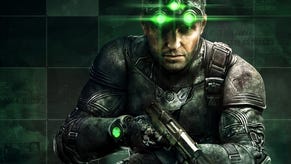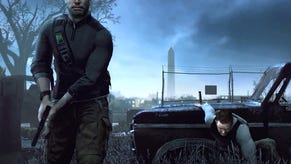Games of 2010: Tom Clancy's Splinter Cell: Conviction
Clancy that.
The plot doesn't really matter, however. What matters is how Conviction, like Arkham Asylum before it, reimagines stealth. For Batman, stealth was all about toying with baddies in vertiginous locations, swooping through the dark, striking, and disappearing again with a burst of unspooling zipline wire and a rustle of bullet-proof velvet. For Fisher, it's something else. It's a puzzle game, actually. Something like Tetris, but with more head injuries.
Stealth has always been a bit puzzly, of course, but by bringing the walls in snugly, throwing in that quick-move cover mechanic, and coming up with the Mark & Execute system - which gives you three or four insta-kills for every risky melee takedown you pull off - Ubisoft has brought it far closer to the realm of pure abstraction.
Conviction may rob you of your night-vision goggles for the most part, forcing you to play through the game taking in a range of office suites, fairground tents and national monuments with no grimy filter to obscure the realistic detailing, but its primary gimmick forces you to read these spaces in an entirely different way.
With enemies, for the most part, thrown at you in clusters of four or five at a time, memorising patrol routes is shoved aside in favour of a much brisker take on human geometry: you tag the trickiest of your foes for one-shot death, isolate a straggler, take him down up-close, and then plug the others with a single button press once you're in range.
At its best, it's pure spatial challenge, in other words - a challenge where most of the fun comes from finding the magical spot on each map that puts your tagged enemies within reach, while allowing you easy access to a melee kill. As such, it strikes me as being strongly reminiscent of another of 2010's unexpected charmers, the iPhone game Helsing's Fire, which has you working out the best place in a room to stick a torch that will illuminate multiple members of the undead, before blowing them to pieces with potions.

Sure, one of these offerings costs 59p and probably took the developer a few afternoons in a pub to hack together, while the other's a triple-A production with a runaway budget and impact on share prices, but that merely illustrates two of the reasons I continue to love games so much: mechanics trump staging regardless of the scale of the production, and big publishers like Ubisoft occasionally have the guts - or the insane desperation - to turn their precious world-famous intellectual properties into lavish mega-spend puzzle titles without telling anyone in advance.
Mark & Execute is easily one of 2010's most pinchable ideas - Bond's already had a go at it in Blood Stone - but it's not the only smart concept lurking within Conviction. Interrogations are a reliable source of brutal Looney Tunes fun, their linear conversations replacing the thick roots of a dialogue tree with an option to stick your companion's head through a TV monitor, while Last Known Position clarifies the limits of the game's AI - a must for any title that encourages you to toy with your foes - whilst simultaneously allowing you to herd enemies into smart traps.
Tying the whole thing together, meanwhile, is a conceit that DICE used with Mirror's Edge: make sure the guns are all dismally unsatisfying, and people will have to explore the full range of their offensive options just to avoid using them.
Elsewhere, Conviction offers a strangely intoxicating mix of slick presentation and cheese-brained design to enjoy: objectives are projected onto the sides of buildings in an astonishingly stylish meeting of form and function, for example, while a bizarrely wretched Iraq flashback sequence makes you appreciate all the clever new gimmicks a little more intently, simply by taking them away from you for a half hour.
Beyond all that stuff, though, there's something shamefully compelling about Sam Fisher on a fundamental level, and it only grows stronger when his most complex behaviours are reduced to contextual button presses. A bit like Lara Croft, Fisher provides awkward lumps like myself with the briefest hints of the pleasures of being physically skilled.
After years of putting up shelves that store books at a series of risqué angles, of making cakes that taste a lot like poison, and of accidentally sitting on sleeping cats, I get to experience what it's like to be canny, decisive, and light on my feet: to size up situations in an instant, to take out foes with the twitch of an eye, and to pick my way through the darkness with assuredness.
For that, then, I'm eternally grateful - even though I still can't quite remember what I did at that airfield.




